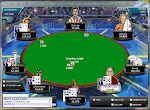Here's how it went down: When the tight/conservative player went all in I started evaluating what I thought he had and I narrowed it down to 10-10, J-J, or Q-Q. I was leaning more heavily to J-J or Q-Q. The reason for this is twofold: I did not think that this player would risk his entire stack unless he had a made hand. This is the case with many more conservative players. This analysis enabled me to eliminate AK and AQ from the possible holdings. I further believed that this player would not push all in in that situation with A-A or K-K, he certainly might have re-raised at that point, maybe to something around $100, in order to isolate against one player, but I didn't think he would go all in. Moving all in at that point was a large overbet of the pot and it indicated to me that he #1: had a hand that he felt needed protection and #2: was willing to take the pot down right there with no further action. These factors combined to make me eliminate A-A and K-K as options. I did not think that he would risk that much money on anything lower than 10s and so that left the three middle pocket pairs, with me leaning more heavily towards J-J or Q-Q. After speaking with Happy Donkey later in the evening, I discovered that his thought process had been almost identical to mine except that he had settled on either 10-10 or J-J. Therefore he made the call believing that he had two live, suited overcards and was coin flipping.
The other player ended up having just that...J-J. So my conclusion is that Happy Donkey made a GREAT read but a BAD call. Even though he correctly identified the hand that his opponent most likely held, he made what was, in my opinion, a donkey call. Here's why: First, there is the Q-Q factor. Q-Q could not be eliminated as a possible hand. If you look at 10-10, J-J, and Q-Q as the most likely hands, two are coin flips and one has you dominated. Second, you have to give yourself a little wiggle room in your calculations for mistakes...if Happy Donkey's read had been off, it was much more likely that it was off and the raiser had a better hand than jacks than it was likely that the raiser had a worse hand than jacks. Lastly, CALLING an all in bet is much more passive than MAKING an all in bet because you have no fold equity when you call. Therefore, while I do MAKE all in bets that I think might result in facing a coin flip situation, I rarely just call if I think that I am coin flipping. I would rather get my money in the pot when I have the best of it. If I had wanted to flip a coin for my money, I would have bet red or black.
Until next time may all your coin flips come up heads!
Wednesday, September 26, 2007
Subscribe to:
Post Comments (Atom)




No comments:
Post a Comment